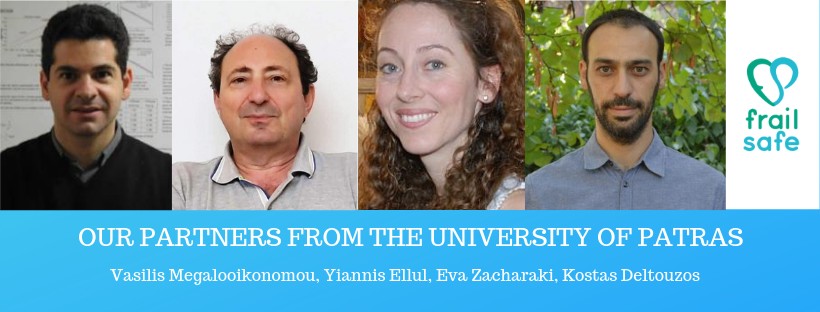Not long to go until the EU FrailSafe final event in Brussels, 3 April 2019. From now on you will be able to get to know one of our partners every week and learn more about their expertise and involvement.
Today we are allowed to introduce you to our partner University of Patras based in Greece with both, clinical and technical expertise. Their committed activities involve the project coordination. You do not want to miss that read! Check it out!

1. What is your role in the EU FrailSafe project?
The University of Patras, Greece, participates in the FrailSafe project with a double role, technical and clinical. The Laboratory of Multidimensional Data Analysis and Knowledge Management in the Department of Computer Engineering and Informatics directed by Prof. Vasilis Megalooikonomou, who is also the coordinator of the project, has been responsible to handle the large amount of anonymised clinical data, build the virtual patient model and the algorithms that can ultimately provide useful information regarding quantitative and qualitative measures of frailty, estimating risk of frailty and loss of intrinsic capacity, and produce personalized recommendations.
The clinical team directed by Associate Professor Yiannis Ellul, a Neurologist and Geriatrician, has been responsible to run the clinical trials in Greece. The clinical team has been assisted by the Panhellenic Geriatric and Gerontology Society. The clinical team introduced FrailSafe gradually to the participants as it had being developed; performed the geriatric clinical assessment and assisted in the design of all instruments/devices, dashboards and wearables for use by the various users of the Frailsafe system (older people and their families, health care personnel, researchers); assisted in the data collection and administration of the data, in the evaluation of the Frailsafe system and the administration of the personalized interventions (through the specifically designed serious games, which were able to assess different domains of their capacity and provide training and reinforcement as well as the personalized health style recommendations provided by FrailSafe).
2. From your perspective – what makes EU FrailSafe innovative?
The Conventional Geriatric Assessment is normally carried out in the clinical settings that we all know. That means that it is carried out with time restrictions, and thus, limited data are collected which undergo subjective interpretation. The innovation with FrailSafe is that older people can be monitored unobtrusively either continuously or intermittently, at their natural environment using multi-signal information collected in real time in all domains that describe Intrinsic Capacity; the large amount of data collected can then be online and offline objectively analysed and provide management recommendations encouraging self-management, as well as facilitating comprehensive integrated care plans. FrailSafe will ultimately support functional independence and wellbeing in older individuals.
3. The project is coming to an end – do you have some preliminary findings to share?
Preliminary results so far confirm that the FrailSafe system can better predict adverse frailty outcomes such as falls, fractures, hospitalization, institutionalization and death than just conventional geriatric assessment.
By collecting and analyzing multiparametric data from all domains involved (physical, cognitive, psychological, behavioral, social, etc) the Frailsafe system acquires a holistic view of the condition of an older person and provides a new Frailty metric useful to clinicians not just for assessment and stratification but also for providing appropriate intervention.
Furthermore, the FrailSafe system can produce through analysis, clusters, i.e., groups of older people who share common characteristics in the different domains (physical, medical, psycho-social, cognitive, lifestyle, nutritional, and wellness), monitor their transition through frailty states, link measurements from ICT devices to clinical assessment and provide decision support and personalized interventions.
The interventions are provided through a suite of serious games challenging accordingly physical, cognitive, psychological, functional and social domains, through recommendations regarding lifestyle, daily activity, exercise, nutrition etc., by providing assistance to comply with medical recommendations and facilitating the adjustment of drugs or drug dosage by the physician based on the objectively measured parameters. The serious games that have been developed especially for older people are also used for assessment of a person’s abilities including physical (strength, endurance, balance) and cognitive (memory, visual and spatial ability, motor skills, attention, decision making, problem solving, processing speed, etc) while being particularly attractive and fun for the older people.

